School to Career Pathway
Success Stories
 Albany International Corporation likes to say it makes paper smoother, tissue softer, and aircrafts lighter. It takes a high level of competency to make fabrics, belts, and other components do that. In order to ensure its many advanced manufacturing techniques are mastered by a new generation of employees, it’s taking on an additional goal: making the workforce stronger.
Albany International Corporation likes to say it makes paper smoother, tissue softer, and aircrafts lighter. It takes a high level of competency to make fabrics, belts, and other components do that. In order to ensure its many advanced manufacturing techniques are mastered by a new generation of employees, it’s taking on an additional goal: making the workforce stronger.
When Albany International moved from Albany, NY to Rochester, NH in 2010, the company recognized the need to be an active participant in its new community. Its role in helping educate the children of employees and the seacoast workforce was not lost on company leaders.
A partnership with UNH that supports teacher training in math and science is funded by Albany International, with specific support going directly to the Rochester school district as well. CEO Joe Morone hopes that other business leaders will embrace this approach in their own school districts.
In addition to supporting teachers, Albany International also takes on interns and opens its doors to students for job shadowing.
Albany International’s efforts are making our students smarter, our workers experienced, and our economy more vibrant.
For more information, please contact Amy Monk, amy.monk@albint.com, (518) 951-0809.
![]() BAE Systems, an aerospace defense company located in Southern New Hampshire, brings a new level of innovation to everything they do. Education is no exception.
BAE Systems, an aerospace defense company located in Southern New Hampshire, brings a new level of innovation to everything they do. Education is no exception.
In addition to partnering with the local community college and career and technical education centers to create and implement relevant curriculum, BAE is also involved in a variety of STEM-related programs for students (Science, Technology, Engineering, and Mathematics).
One well-known program that BAE supports through sponsorships and coaching is the FIRST robotics competition, founded by inventor Dean Kamen. Engineers from local businesses team with high school students to build robots that compete in competitions that have all the energy of a championship sports match. “Employees really enjoy getting involved in this,” according to Senior Vice President Guy Montminy.
FOCUS (Fostering Opportunities and Careers Utilizing STEM) is a 12-week program for high school students that runs three times a year. Started at BAE over 15 years ago, the curriculum covers mechanical, electrical, and software engineering, as well as project management. Students who are interested in engineering get a leg up over their peers through the hands-on experiences provided.
Perhaps most exciting is the Women in Technology initiative, in which BAE collaborates with area high schools to introduce young women to a variety of technical careers. BAE employees mentor the students throughout the program, which can run between 7 and 13 sessions long, depending on the location. Similar in content to the FOCUS program, Women in Technology has the added benefit of promoting some of the non-traditional roles for women at the early stages of career development for students in the program.
It’s this kind of dedication to innovation which will ensure the next generation of New Hampshire workers is ready for the challenges ahead.
For more information, please contact Karen Harris, karen.b.harris@baesystems.com, (603) 885-3039.
 As one of New Hampshire’s largest employment sectors, a shortage of qualified workers in healthcare is not just a labor concern. It’s a public health concern.
As one of New Hampshire’s largest employment sectors, a shortage of qualified workers in healthcare is not just a labor concern. It’s a public health concern.
With demand for medical professionals on the rise, those in the healthcare sector are faced with the enormous task of recruiting and training large numbers of employees to fill their open positions. Many employers are finding traditional methods of recruitment are no longer enough, and are getting creative with the way they look at workforce development.
Dartmouth-Hitchcock Medical Center (DHMC) is one of these employers.
DHMC has recognized that exposing students to career options early on is useful for both the student and the potential employer. A pilot program in the Kearsarge Regional School District has a DHMC nurse working with students during the school day. The program also introduces the students to nine days of experiential learning onsite at the hospital. As a part of this program, students learn about various career pathways available to them within healthcare, so they can see how their career might blossom over time.
For those who are already in the workforce, DHMC offers Registered Apprenticeships for Medical Coders, Medical Assistants, and Pharmacy Technicians, which help employees gain skills while earning a training wage. Onsite training also exists for LPNs who are interested in becoming RN’s, allowing those employees to work full time while earning credits.
Growing a healthcare workforce that is properly trained and motivated to work in New Hampshire benefits not only employers like Dartmouth-Hitchcock Medical Center. It benefits all of our residents who deserve the highest quality care available. Creating new opportunities for staff to achieve credentials is just what the doctor has ordered.
For more information, please contact Sarah Currier, Director of Workforce Development for DHMC.
![]()
When Elektrisola creates copper wire, what it’s really creating are connections. Without those wire connections, their clients can’t complete production of their products. When it comes to growing its workforce, the Boscowen manufacturer made its own connections with the Concord school district and TEAMS Charter School, where students are linked to internships at Elektrisola.
Over the course of several weeks during the school year, student interns spend a total of 16 hours on-site at the facility learning the basics about a variety of positions within the company. According to Human Resource Manager Jen Raimer, “Working with and having the opportunity to influence our future workforce brings a high level of personal satisfaction to our management team. Young adults see our world through different eyes. They offer us a renewed enthusiasm and appreciation for the work we do every day.”
The focus of these internships isn’t solely on the development of technical skills, but social and professional skills as well. Managers have observed a noticeable difference in the levels of maturity and confidence in students who participate in the program at Elektrisola. “We can't possibly think of anything more rewarding than playing a small role in this enrichment experience,” says Raimer.
The company has also connected with NHTI and Granite State College, and provides full reimbursement for professional development of its employees. In addition, Elektrisola presented an engineering scholarship to a student at Merrimack Valley High School in the spring of 2017.
Training and educational opportunities for the next generation of workers have a lot in common with copper wire. They have to be solid. They have to be durable. And they have to connect all the important components if everything is going to run right. For their part, Elektrisola is ensuring those connections are made now and in the future.
For more information, please contact Jen Raimer, jraimer@elektrisola-usa.com, (603) 796-3052.
 When you want to address a critical health issue, you go where the experts are. The medical staff at Exeter Health Resources facilities is always standing by to diagnose problems and seek solutions. So it should be no surprise that when you need to address a critical workforce issue, the same people at these facilities are also looking for ways to address this problem.
When you want to address a critical health issue, you go where the experts are. The medical staff at Exeter Health Resources facilities is always standing by to diagnose problems and seek solutions. So it should be no surprise that when you need to address a critical workforce issue, the same people at these facilities are also looking for ways to address this problem.
New Hampshire’s workforce development challenges are affecting all employment sectors, including health care. When critical labor needs arise, partnerships with post-secondary educational institutions can often help provide solutions.
Exeter Health Resources, which includes Exeter Hospital, Core Physicians and Rockingham Visiting Nurse and Hospice, has been involved in efforts to strengthen the state’s workforce for years. Tuition reimbursement for employees enrolled in college courses, traditional clinical rotation training for nurses, radiology technicians and other therapists, as well as a healthy relationship with the local high school Career and Technical Education center, are well established within the health system. More recently, a critical shortage of medical assistants led Core Physicians to partner with Great Bay Community College in a new and unique way.
When Physicians first approached the Community College System, it had a two-year Medical Assistant program in place. The need for assistants was crucial, though, so the college worked with the hospital to create a 12-week certificate program that paid students a training wage while enrolled in the program full-time. The program has been in place for two years, and has expanded to help other area hospitals train their employees as well.
Great Bay and Core Physicians recently launched a Medical Office Specialist Training Program based on the same model. The program started with three trainees, employed by Core Physicians, and is looking to expand further at Great Bay’s Portsmouth campus and its new location in Rochester.
Creating pathways to receive proper training is the prescription for long-term workforce health.
For more information, please contact Chris Callahan, VP Human Resources.
 For financial planners, “today” is important, but “tomorrow” is priority. The secret to success is doing things now that will achieve the best result tomorrow. Just like evaluating today’s economic trends to determine the financial needs of the future, Fidelity Investments is examining today’s labor pool to determine what their own workforce needs will be down the road.
For financial planners, “today” is important, but “tomorrow” is priority. The secret to success is doing things now that will achieve the best result tomorrow. Just like evaluating today’s economic trends to determine the financial needs of the future, Fidelity Investments is examining today’s labor pool to determine what their own workforce needs will be down the road.
Each summer more than 100 interns join the Fidelity team in Merrimack. These paid internships provide exposure to diverse career paths available within the company, and help students understand how each role is critical to Fidelity’s mission to inspire better futures and deliver better outcomes for the customers and businesses it serves.
As one of the largest finance and technology employers in the state, Fidelity Investments is widely known for its support of local communities and its investment in its employees. Walking through its Merrimack campus, it’s apparent that the health and well-being of Fidelity’s employees has been taken into consideration along the way. What many might not be aware of is employees’ support begins even before the date of hire.
Fidelity Investments is committed to workforce development. Fidelity employs more than 5,500 associates on its Merrimack campus and the Nashua Investor Center. These associates represent a diverse range of career levels, from entry level to senior leaders, in the fields of technology, investment management, client and relationship management, and operations.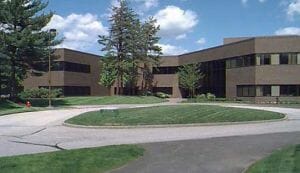
Fidelity collaborates with the IT Sector Partnership Initiative, University System of New Hampshire, BIA, and New Hampshire Charitable Foundation to support a variety of workforce development efforts across the state.
As any good advisor will tell you, the best time to make an investment in your future is right now. With Fidelity Investments efforts to grow the state’s workforce, lucrative dividends are expected for years to come.
For more information, contact Joe Murray, VP Public Affairs. (603) 791-5727
 The soft hum of sewing machines greets your ears as you walk onto the floor of Globe Manufacturing. When the company started making protective coats for firefighters in the 1880s, all an employee needed to know was how to cut and stitch by hand. Today, employees at the oldest and largest producer of firefighter turnout gear in the world need to know how to operate the industrial equipment that assembles the coats and pants to rigorous specifications.
The soft hum of sewing machines greets your ears as you walk onto the floor of Globe Manufacturing. When the company started making protective coats for firefighters in the 1880s, all an employee needed to know was how to cut and stitch by hand. Today, employees at the oldest and largest producer of firefighter turnout gear in the world need to know how to operate the industrial equipment that assembles the coats and pants to rigorous specifications.
Due to the nature of the work, most of Globe’s employees arrive with little or no job-specific training. Employees are trained on-site at the company’s Pittsfield facility. Post-secondary degrees are not necessary for the majority of the company’s positions; however, this does not diminish Globe’s dedication to increasing opportunity for students in their community and beyond.
It’s hard to miss the smiling faces of all ages, gender, and color on the shop floor, all dedicated to the same mission: To bring firefighters home safely. “It’s a mission everyone can get behind,” says Human Resource Manager Gayle Troy.
Their own educational mission is one that is easy to get behind as well. Troy takes part in local job fairs, and assembled a packet of information students can use when they begin their job searches. It includes helpful hints of all sorts, and is designed to give students the guidance they need for landing their first job (whether it be in manufacturing or in an office). Globe also conducts mock interviews for students and opens its doors for student tours.
The skills required 135 years ago (or even 35 years ago) are certainly not the same as those needed in today’s advanced manufacturing workforce. In order to keep up with the times, Globe and its employees have evolved. As the nature of advanced manufacturing in New Hampshire continues to change, Globe is among those ensuring the workforce will be prepared to change along with it.
For more information, please contact Gayle Troy at gtroy@globefiresuits.com or (603) 435-1822.
 While many large businesses can tell you about the difficulties they face filling open positions in the current job market, a shallow labor pool may affect small businesses even more. When fewer hands are utilized to make products, it’s particularly important each employee has the necessary skills to be productive. And it’s particularly disruptive to operations when a job remains unfilled because suitable candidates are hard to come by.
While many large businesses can tell you about the difficulties they face filling open positions in the current job market, a shallow labor pool may affect small businesses even more. When fewer hands are utilized to make products, it’s particularly important each employee has the necessary skills to be productive. And it’s particularly disruptive to operations when a job remains unfilled because suitable candidates are hard to come by.
Many small business owners struggle to find ways to engage with students, as time and resources are often stretched thin. With just 25 employees, Jaffrey-based manufacturer Graphicast provides a wonderful example of how a small business can take a slightly different approach to workforce development than some of its larger counterparts in industry.
Graphicast occasionally takes on an intern or partners with local colleges on research projects, but much of its focus is on workforce development outside its walls.
CEO Val Zanchuk is active on numerous boards and committees throughout the Monadnock region and state, and lends his support to many programs and initiatives that support education, particularly within manufacturing and engineering. He has also established strong relationships with area schools, which allows for communication on programming and coursework that helps to better align training with industry needs.
For smaller businesses such as Graphicast, the partnerships formed by simply getting involved can be a useful tool for ensuring that the needs of their particular industry are being met by educators. Even for offices, medical clinics, or small manufacturers – where fewer hands are often the norm – an investment of interest, time, and knowledge can strengthen the workforce. This means that with the right staff of qualified employees, small businesses can perform just like their giant competitors.
For more information, please contact Val Zanchuk, vzanchuk@graphicast.com or (603) 532-4481.
 For many people in the Granite State, the Grappone name is a familiar one. Over the course of four generations, the Grappone family has been a fixture in Concord, known not only for the cars they sell, but also for their commitment to the community.
For many people in the Granite State, the Grappone name is a familiar one. Over the course of four generations, the Grappone family has been a fixture in Concord, known not only for the cars they sell, but also for their commitment to the community.
A renovation completed in 2012 at one of Grappone’s dealerships almost doubled its shop capacity. This led to additional job opportunities within the company. Historically, a partnership with Manchester Community College helped to place those who participated in a specialized automotive training program with internships at Grappone. All of these internships are paid, which allows the students to both learn and earn at the same time. They’ve now expanded the program to Lakes Region Community College.
Grappone is actively involved in the Concord Regional auto tech program. Students are matched with a mentor technician who is able to share real world experience. “From my perspective, teaming up with the local high school and community college automotive programs is a terrific way for young people to try their hand at a career in the automotive field,” says owner Amanda Grappone Osmer.
Many new hires come out of these programs and make a career in the automotive industry. Service Manager Adam Memmolo is a perfect example: during his high school years, he took part in the auto program at Concord Regional Technical Center. He then earned his associate degree in Applied Science at Manchester Community College. He now works with both schools on a variety of projects and tries to support them whenever he can.
“In my opinion these programs groom local talent, and help transition these students out into the work force,” says Service Manager Adam Memmolo. “So many students graduate and leave the state. By supporting these programs we get to help ensure students have what they need to be successful and provide an opportunity for them here in their own back yard.”
Team members have joined various advisory committees for local college and high school auto programs, allowing them the opportunity to provide input on curriculum that will help students succeed in the field. They also attend events such as career fairs, fundraisers, car shows, auto repair competitions, and have even held a class on job interview skills.
According to Service Manager Scott Hodgdon, both students and employees appreciate the support that they are given at Grappone. “One team members who is currently enrolled in a specialized Toyota training program described being employed with us as one of the best opportunities of his life.”
For more information, contact Amanda Osmer, aosmer@grappone.com.
 At the cross-section of two highways in Milford sits Hitchiner Manufacturing. The company operates as a kind of intersection between two technologies: using one of the oldest mold-casting techniques known to man to fabricate parts for the world’s newest, most advanced aircraft. The combination of past and future is a formula that sustains them.
At the cross-section of two highways in Milford sits Hitchiner Manufacturing. The company operates as a kind of intersection between two technologies: using one of the oldest mold-casting techniques known to man to fabricate parts for the world’s newest, most advanced aircraft. The combination of past and future is a formula that sustains them.
Likewise, Hitchiner recognizes in order for its business to thrive, it must harness the knowledge of its veteran workforce and share it with the next generation of prospective employees.
The company is engaging in workforce development in a multitude of ways. At the high school level, partnerships with Milford High School, Souhegan High School and ConVal Regional High School allow Hitchiner to be a part of the conversation surrounding curriculum development. The company is involved with a high school internship program and also hosts a job shadowing program which allows students to experience certain jobs at Hitchiner.
The focus on strengthening the labor poor also extends to those already employed by the manufacturer. Hitchiner employees are able to access the Robotics Certificate and Mechatronics Certificate programs at Manchester Community College in order to advance within the company. Similarly, an Engineering Certificate is available through Keene State College. Several employees are also working towards MBAs at the University of New Hampshire. In many cases, financial assistance is provided through Hitchiner to help employees attain their educational goals.
In addition to these initiatives, Hitchiner also donates manufacturing equipment to schools, provides scholarships to local students, participates in Manufacturing Week and summer internships, job fairs, and lecture series. The company is involved in the Manufacturing Sector Partnership Initiative (SPI) and the Regional Consortium for Advanced Manufacturing (RCAM). Company leaders sit on a variety of committees and advisory boards that help support workforce development.
Using the lessons of the past to achieve success in the present has worked for Hitchiner Manufacturing on the factory floor. Investing in today’s students to ensure a new generation of prepared, engaged workers will benefit all of New Hampshire in the future.
For more information, please contact Tim Sullivan, Vice President, Corporate Affairs and Services.
![]() Long before the issue of workforce adequacy was on the minds of New Hampshire employers and policy makers, Hypertherm was doing something about it. For several decades, the Hanover-based manufacturer has been dedicated to teaching the next generation (and the generation after that) skills needed for twenty-first century manufacturing.
Long before the issue of workforce adequacy was on the minds of New Hampshire employers and policy makers, Hypertherm was doing something about it. For several decades, the Hanover-based manufacturer has been dedicated to teaching the next generation (and the generation after that) skills needed for twenty-first century manufacturing.
Starting with its involvement in the founding of the Upper Valley Business Education Partnership in 1998 (previously called School to Work), Hypertherm long believed that investing upstream in educational pathways was critical to its success.
Through a partnership with River Valley Community College and Vermont HiTEC, Hypertherm produced a paid nine-week boot camp at the Hypertherm Technical Training Institute for new machine operators. It provides 28 hours of college credit and culminates with a certificate that can be applied towards an Associate’s Degree.
On any given week you’ll find school buses filled with middle and high school students who spend part of their day at Hypertherm touring the company’s high-tech manufacturing facilities, participating in hands-on STEM activities, and interacting with engineering and manufacturing associates. Over 900 students toured Hypertherm during the last academic school year.
The company also provides a summer internship for rising high school juniors and seniors. Over the course of 8 weeks, attendees earn 18 credits while also getting paid. A STEM camp was held for middle school students during school vacation week in early 2017 and received rave reviews. The curriculum is now being shared with businesses and schools around the country at no cost.
In addition, Hypertherm brings in teachers during their professional development days to get a sense of how academics relate to a real-world work environment, as well as the career opportunities available to their students. Hypertherm has also brought in educators for summer paid externships, allowing them to learn about advanced manufacturing and to bring that knowledge back to the classroom.
For twenty years, Hypertherm has been striving to train the highest quality workers. Many of those first students are enjoying a career in advanced manufacturing today. Thanks to the many efforts of Hypertherm, the next generation of workers is already getting the skills they need to succeed.
For more information, please contact Tim Renner, Program Manager, Hypertherm.

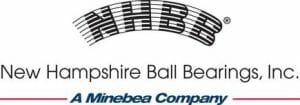 Strong partnerships between education and industry can produce incredible results. New Hampshire Ball Bearings (NHBB), with locations in Laconia and Peterborough, is a perfect example of how industry can partner with educators to create mutually beneficial relationships and expand opportunities for students.
Strong partnerships between education and industry can produce incredible results. New Hampshire Ball Bearings (NHBB), with locations in Laconia and Peterborough, is a perfect example of how industry can partner with educators to create mutually beneficial relationships and expand opportunities for students.
NHBB has been involved with workforce development for over a decade. During this time the company worked diligently to forge strong partnerships with the educational community to create pathways to careers within its industry.
At the high school level, NHBB sponsors and supports the Huot Technical Center in Laconia, most notably with curriculum design, technical assistance, and internships for their Pre-Engineering and Manufacturing Engineering Technology Program. At ConVal Regional High School in Peterborough students can take part in a full immersion program (two-day-a-week internship at the plant in addition to three days of classes at school) called “Manufacturing Principles and Processes.” This credit course was planned jointly by the high school and NHBB to personalize and deepen students' understanding of manufacturing careers.
NHBB is involved in post-secondary training as well. Employees serve on policy advisory boards and as course instructors for CNC machining at Lakes Region Community College.
Employees are also strongly encouraged to gain formal credentials. Many employees have Professional Development Plans and take advantage of both in-house and online technical training through “Tooling University.” There are also external credentials offered through both the University System of New Hampshire and the Community College System. The company also has an engineering apprenticeship program in place for the past ten years into which graduates in mechanical engineering from UNH are given placement priority.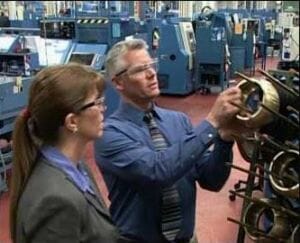
Working hand-in-hand with educators is producing results for New Hampshire Ball Bearings. What opportunities can your business find through internships, apprenticeships, and other school-to-pathways initiatives?
For more information, please contact Gary Groleau, Corporate Manager of Labor Relations & Organizational Development, 603-524-0004 Ext. 6202.
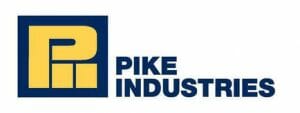 The road to success begins with…well…a road. Pike Industries has been producing road asphalt and building roads roads since the 1870s, making it one of the largest construction materials supplier and road builders in New England. But the road for Pike has gotten bumpy when it comes to the outlook of the labor pool. The company recognizes that to maintain its competitive position it needs a reliable supply of adequately trained employees, something they’re not seeing on the horizon.
The road to success begins with…well…a road. Pike Industries has been producing road asphalt and building roads roads since the 1870s, making it one of the largest construction materials supplier and road builders in New England. But the road for Pike has gotten bumpy when it comes to the outlook of the labor pool. The company recognizes that to maintain its competitive position it needs a reliable supply of adequately trained employees, something they’re not seeing on the horizon.
Many high school students are interested in taking on a part time job, but few have the opportunity to do so while earning high school credit. Pike Industries, located in Belmont, is changing that through their partnership with Belmont High School. For the first time, Pike has brought on a high school student who is interning and job shadowing at their Hooksett location. This student is learning the ropes, getting paid as an employee, and is earning school credits at the same time. An enormous benefit to both student and employer!
Though Pike Industries is just beginning to explore these types of relationships with area high schools, they have been involved with more traditional internships for some time. Twelve students took part in a paid internship program last year, with three being hired as a result. At the end of their program, each student makes a formal presentation to Pike’s senior management team about what they learned, and a graduation ceremony is held to honor the students for their hard work.
By taking a pro-active role in training young people for skills employers want, Pike is laying the groundwork for a stronger workforce in New Hampshire. This will give the asphalt supplier the confidence when traveling the road ahead.
For more information, please contact Sara Colson.
 Each day, about 15 students from the towns of Claremont and Langdon pile onto a yellow school bus. After the hiss of the air breaks and the grind of the engine’s gears, the bus lurches toward its final destination. Not the high school or the regional technical center. The doors open in front of Whelen Engineering in Charlestown.
Each day, about 15 students from the towns of Claremont and Langdon pile onto a yellow school bus. After the hiss of the air breaks and the grind of the engine’s gears, the bus lurches toward its final destination. Not the high school or the regional technical center. The doors open in front of Whelen Engineering in Charlestown.
Through its innovative “Little League of Manufacturing,” Whelen Engineering is working with area high, middle, and elementary schools to expose students to career opportunities in advanced manufacturing.
The inspiration for the Little League of Manufacturing came from Whelen's executive vice president, the late John Olson. Working with former school Superintendent Jacqui Guillette, the plan was to create a curriculum for classes that could be held at a manufacturing facility for high school students.
“The idea wasn’t to create workers per se,” says Guillette, “but to show them, and their parents, the multitude of career opportunities and jobs manufacturers offer today.”
Students from Stevens High School and Fall Mountain Regional High School are brought to Whelen during normal school hours. Credit-bearing classes are taught by staff right on Whelen’s campus. Whelen creates a wide variety of emergency lighting for public safety vehicles and aircraft. Students have the opportunity to work with machines, job shadow, and learn about various career options within Whelen.
Introducing the next generation of employees to careers in advanced manufacturing is not limited to high school. For younger students, curriculum is taught at the middle school. Here industry partners are brought in as guest speakers, and field trips are offered for support. At the elementary school level, curriculum is woven into new state standards as a unit that can be taught in grades 4 or 6. In addition, middle school vacation STEM camps have been developed, as have afterschool programs and extended learning opportunities (ELOs).
Whelen Engineering’s goal is to see similar efforts throughout the region and through the industry. The company’s curriculum and facilitator support is non-proprietary and available at no cost for other companies and schools interested in this approach.
When the lessons are over, the students pile back onto the bus and head back to school. The hope is that some will leave the “Little League of Manufacturing” and return someday to the “Big League” – as a fully-trained employee for Whelen or another advanced manufacturer.
For more information, please contact Jacqui Guillette, Educational Consultant, (603) 558-1953.

Graphicast CEO Val Zanchuk is a leader in advancing NH's future workforce.
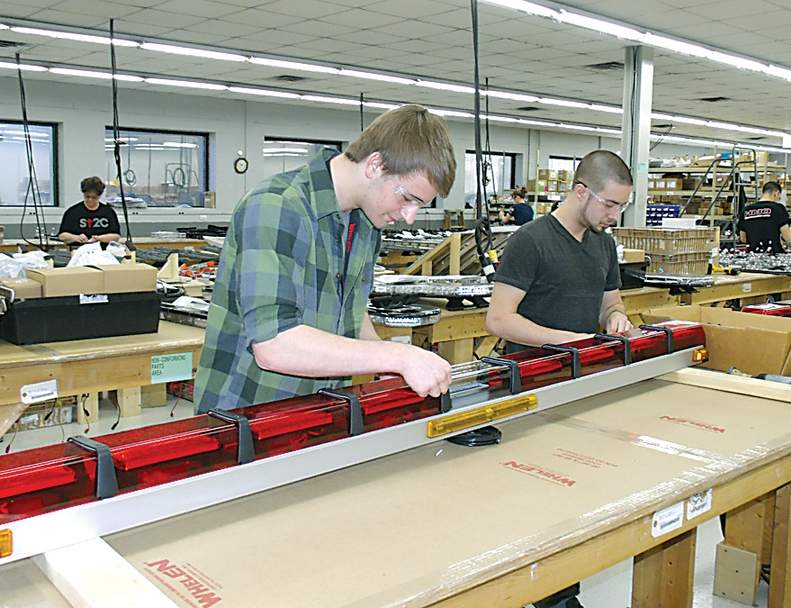
Valley Regional High School junior Jacob Beaulieu, with the help of production assembler Brandon Camp, puts together an ambulance light box at Whelen Engineering as part of a their educational program.

Students at Portsmouth High School are among those participating in programs designed to increase skills desired in the 21st century workforce.
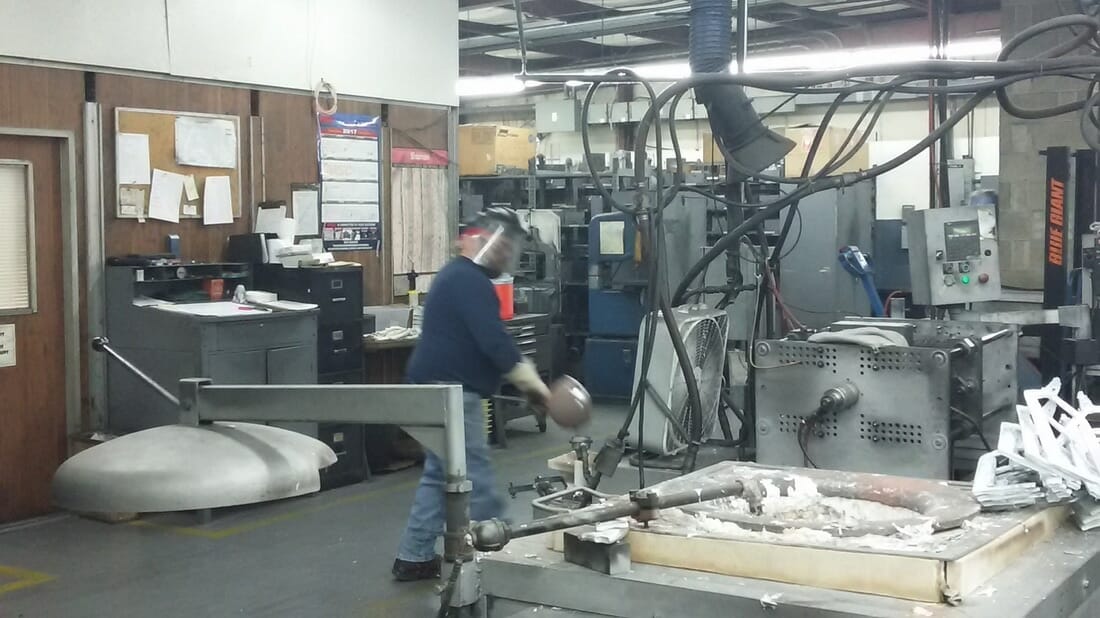
Manufacturers across NH, like Graphicast in Jaffrey, are putting their own initiatives together to address workforce needs.
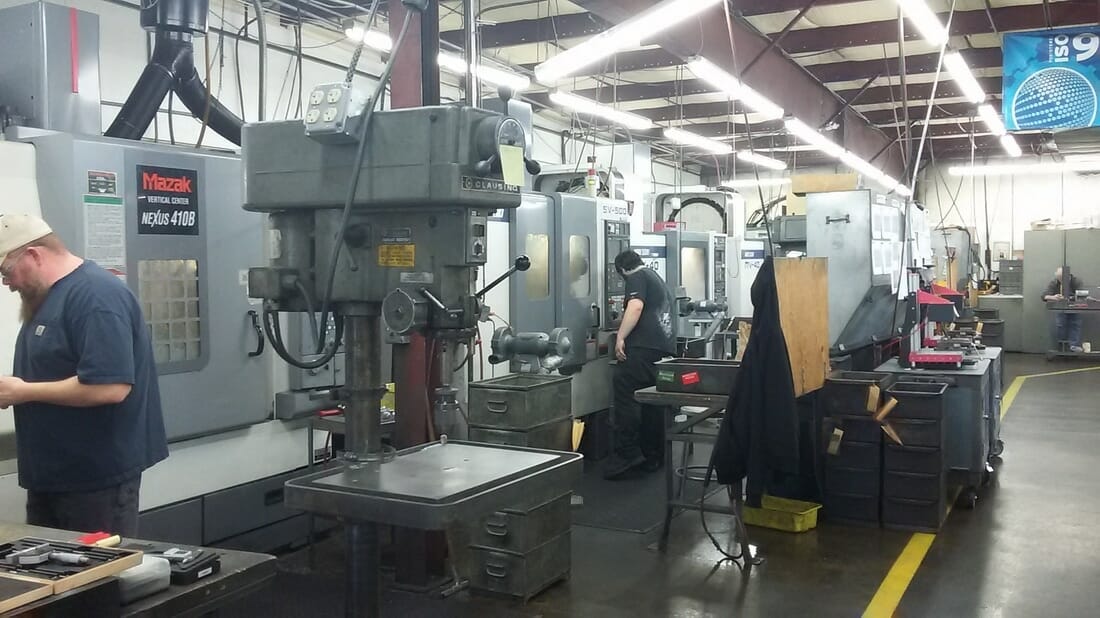
Manufacturers across NH, like Graphicast in Jaffrey, are putting their own initiatives together to address workforce needs.
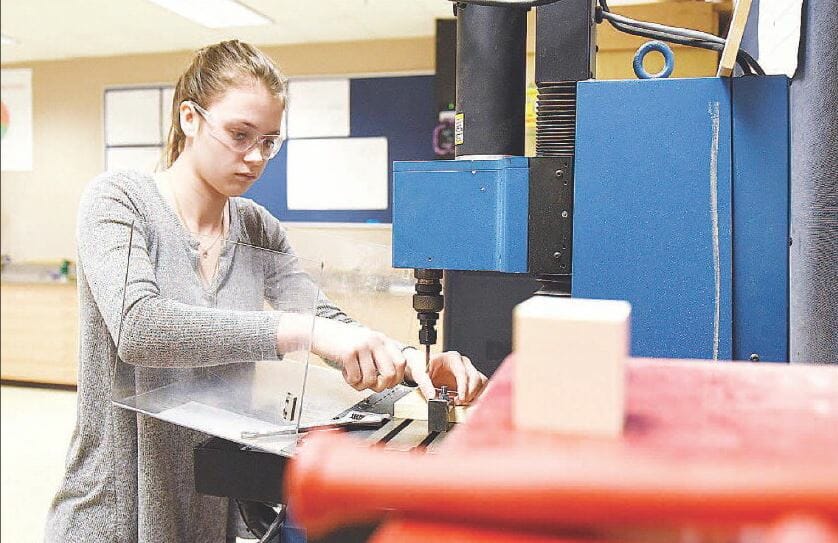
Samantha Cormier, a junior at Spaulding High School in Rochester, works in the engineering lab at the school’s technology center. She was setting up a computer-controlled milling machine.
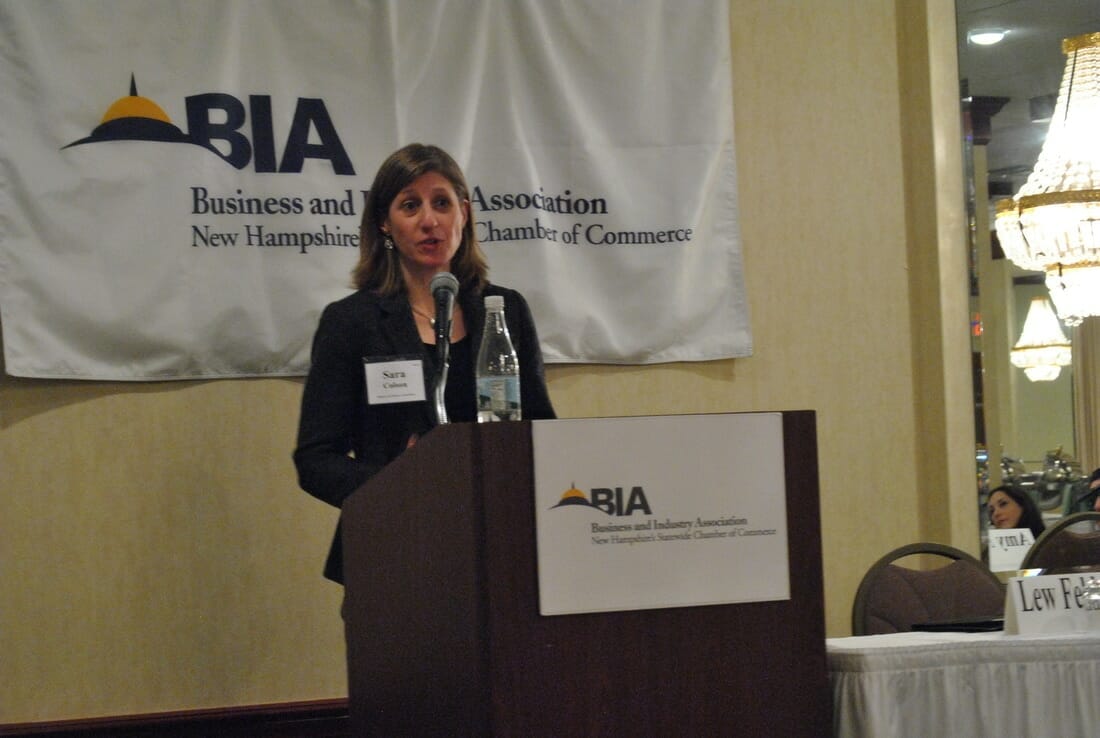
BIA Workforce Development Director Sara Colson addresses an audience of employers, educators, policy makers, and families to discuss the challenges of the current labor pool.
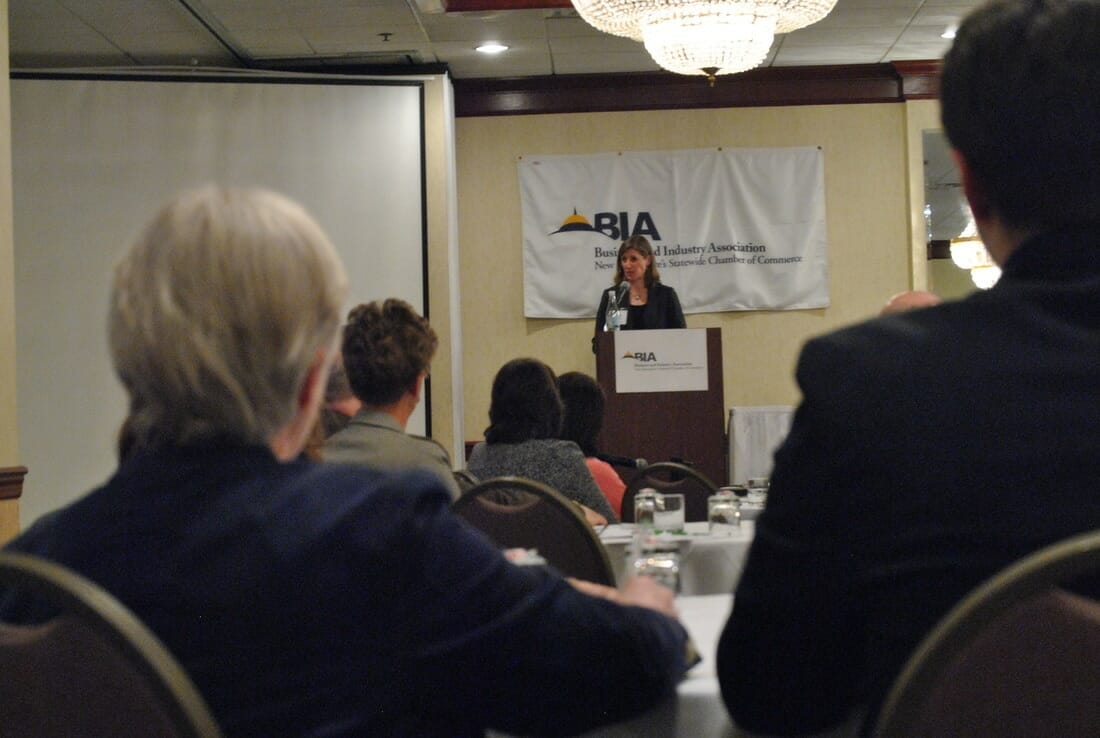
BIA Workforce Development Director Sara Colson addresses an audience of employers, educators, policy makers, and families to discuss the challenges of the current labor pool.
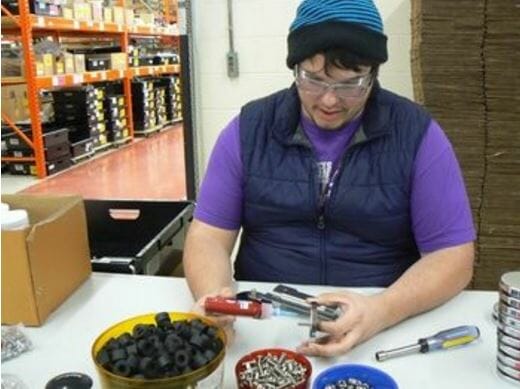
Riley Murray, 19, of Claremont, works on assembling parts at Whelen Engineering in Charlestown.

Graphicast CEO Val Zanchuk is a leader in advancing NH's future workforce.

Valley Regional High School junior Jacob Beaulieu, with the help of production assembler Brandon Camp, puts together an ambulance light box at Whelen Engineering as part of a their educational program.
